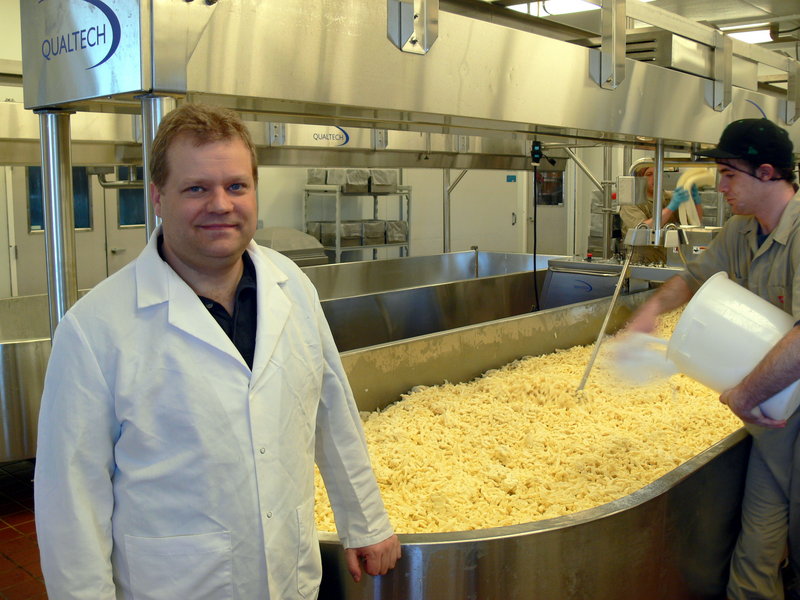Cheese is an old food and is mentioned in the Bible. In addition to salt, Romans paid their soldiers in cheese and are credited with recording the first recipe. Like beer, it’s one of those products that was probably discovered by accident – the result of just the right ingredients and conditions.
Mark Whitney, creamery manager at Pineland Farms in New Gloucester, says nobody knows for sure, but this velvety delectable probably occurred while transporting milk across the desert. Cultures of early times typically carried milk in natural containers like animal stomachs.
“The rennet enzyme, which makes milk coagulate, is naturally found in the stomach,” Whitney said. “So if you put milk in one of those stomach skins strapped to your camel riding across the desert, by the time you got to your destination the heat and the enzyme would have turned the milk into curds.”
Today this basic process has been refined to science and art at Pineland Farms. Half a million pounds of cheese will be made here this year, and gold medals have been taken at international competitions.
Whitney, 38, a Vermont native and Pineland’s first creamery manager, is typically the reserved and quiet type. But get him talking about cheese and he starts to get a gleam in his eye and a little giddy.
Q: How did you become top cheese maker at Pineland Farms?
A: I’ve been making cheese since 1995. I was making it at a small farm in New Hampshire, Boggy Meadow Farm in Walpole, where I’d been for about 10 years, when I got a call that someone (from Pineland) wanted to come speak with me about making cheese.
I didn’t know anything about the Libra Foundation at that time (2004). There was a dairy farm here already in operation, but Pineland wanted to turn its milk into a value-added product. Milk prices go up and down a lot, but the cheese market doesn’t fluctuate very much. Plus you can store cheese longer and ship it further. Cheese making also fits in well with the educational component of Pineland’s mission.
Q: How do you like living and working in New Gloucester as opposed to your native Vermont?
A: New Gloucester still has a small-town country feel, yet we’re located 25 minutes from Portland. I like being close to the ocean; this location offers a lot. Growing up in Vermont I was right in the mountains, so I miss mountains. Maine has them, you just have to drive further. I like being able to see Mount Washington from my office.
Q: What do you like about your job?
A: I like the grading process very much. Cheese making has a unique quality to it. You can give five cheese makers the same recipe and you’re going to get five different cheeses. There are a lot of variables. I like to share information with other makers about cheese. I’m proud of the quality of cheese that we make here. We’ve won awards every year from the American Cheese Society that sponsors the most prestigious competitions in North America.
I like traveling to the competitions and conferences where you’re pitching your knowledge against others. It’s an honor to bring home a ribbon because of getting that recognition. It’s great; it’s a learning experience.
Small cheese makers can’t always attend a faraway competition, but being with Pineland has allowed me to get some great experiences.
Q: Any cheese you’re more proud of than another?
A: The Salsa Jack’s progression has been interesting. In 2007 it was third place (at the American Cheese Society competition). In 2010 it took second place, which means we’re maintaining and improving our quality. I’d love to see us get first place this year.
Don Perkins is a freelance writer who lives in Raymond. He can be reached at: presswriter@gmail.com
Send questions/comments to the editors.



Success. Please wait for the page to reload. If the page does not reload within 5 seconds, please refresh the page.
Enter your email and password to access comments.
Hi, to comment on stories you must . This profile is in addition to your subscription and website login.
Already have a commenting profile? .
Invalid username/password.
Please check your email to confirm and complete your registration.
Only subscribers are eligible to post comments. Please subscribe or login first for digital access. Here’s why.
Use the form below to reset your password. When you've submitted your account email, we will send an email with a reset code.